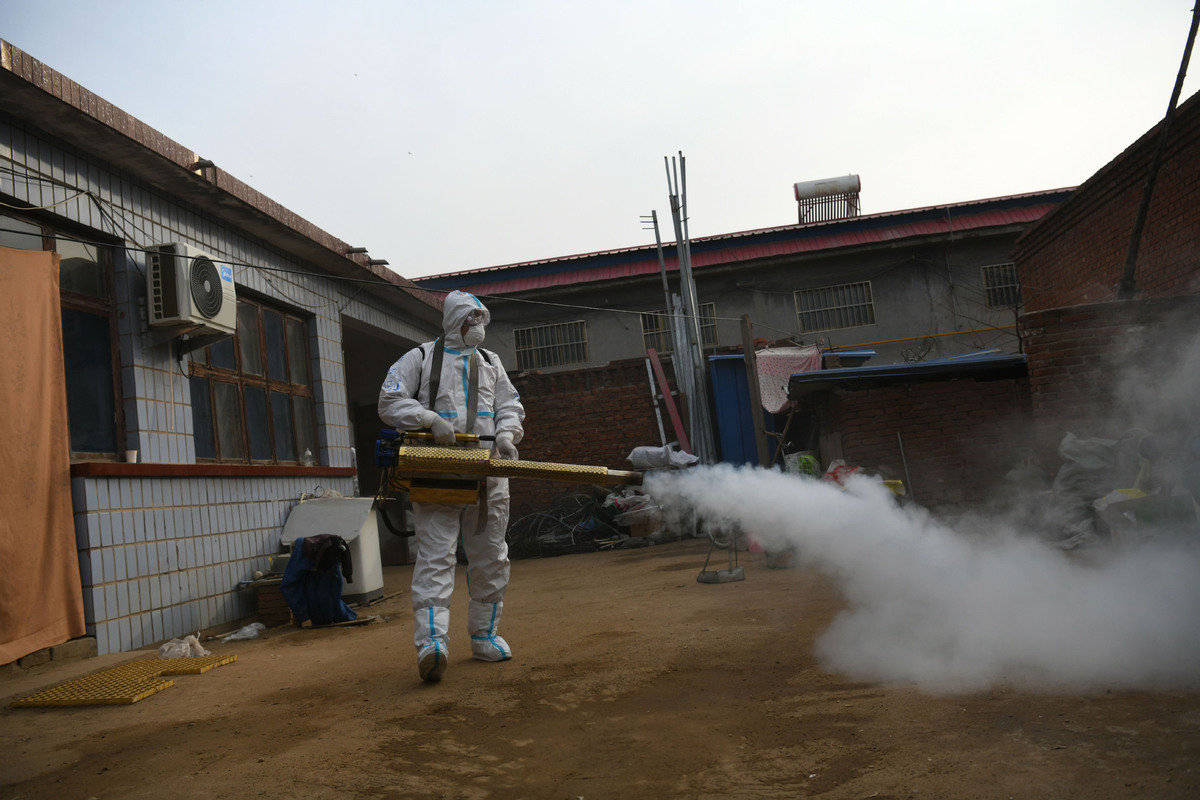Local authorities should not ban or add extra requirements for people returning to rural areas for family reunions during next month's Spring Festival holiday, the most important traditional Chinese holiday, a health official said on Sunday.

A volunteer sprays disinfectants at a courtyard in a village of Shijiazhuang city, North China's Hebei province on Jan 14, 2021. [Photo/Xinhua]
China has ramped up epidemic prevention and control efforts in its rural areas to cope with the heightened transmission risk that will accompany the mass migration during the holiday.
People must produce a negative result for a COVID-19 test taken within seven days before returning to rural areas for family reunions, according to a notice issued by the National Health Commission.
Such travelers should also monitor their body temperatures and overall health at home for 14 days and take a COVID-19 test every seven days, the notice said.
Commission spokesman Mi Feng said such policies are meant to reduce the risk of transmission, not to hinder family reunions beyond the requirements of epidemic prevention and control measures.
Banning people from returning to rural areas or increasing requirements are lazy policies and a waste of epidemic containment resources, he said at a news conference held by the State Council's joint prevention and control mechanism against COVID-19.
With the exception of Beijing, no provincial-level regions should prevent people in other regions from returning to their hometowns in rural areas during Spring Festival or put them in quarantine, Mi said.
From Thursday to March 15, people from low-risk areas traveling or returning to the national capital must produce a negative result for a COVID-19 test taken within seven days, the city said on Wednesday. They should also monitor their body temperatures and overall health at home for 14 days and take a COVID-19 test every seven days, it said, adding that travelers from medium-and high-risk areas will be barred from entering the capital during the period.
People traveling to urban areas in other provincial-level regions or to rural areas in the same region are not required to have negative COVID-19 test results, Mi said, adding that travelers to rural areas in the same region also do not need to undergo 14 days of home monitoring.
The country has administered more than 24 million doses of COVID-19 vaccines during its mass vaccination campaign, said Xu Wenbo, head of the National Institute for Viral Disease Control and Prevention, part of the Chinese Center for Disease Control and Prevention.
The vaccination campaign, which began for key individuals in mid-December, is progressing in an orderly fashion, he said. The country will adjust its vaccination plan based on its epidemic situation, progress on vaccine research and development and the supply of vaccines.
Based on initial reports, the rate of side effects from COVID-19 vaccines is similar to that of any vaccine that went on the market in 2019, he said.
The rate of serious side effects from COVID-19 vaccines is no higher than that of flu vaccines and is slightly lower than vaccines released in 2019, he added.
Li Ning, deputy director of the China National Center for Food Safety Risk Assessment, said while reports about food testing positive for novel coronavirus have received widespread public attention, the chances of infection via contact with food in China, including imported cold-chain food, are very low.
The overall positive rate of food or food packages contaminated with the novel coronavirus is very low in the country-less than 1 out of 10,000, she said.
It's possible for samples of food or food packages to test positive for the novel coronavirus, but it only suggests they have been contaminated by the virus and does not necessarily mean they can spread it, Li said, adding that there have been no reports of people contracting the virus from purchasing or processing food.
Despite low risks of contracting the novel coronavirus from food, consumers should still take precautionary measures when handling it, especially by paying attention to hand sanitization, she said.


